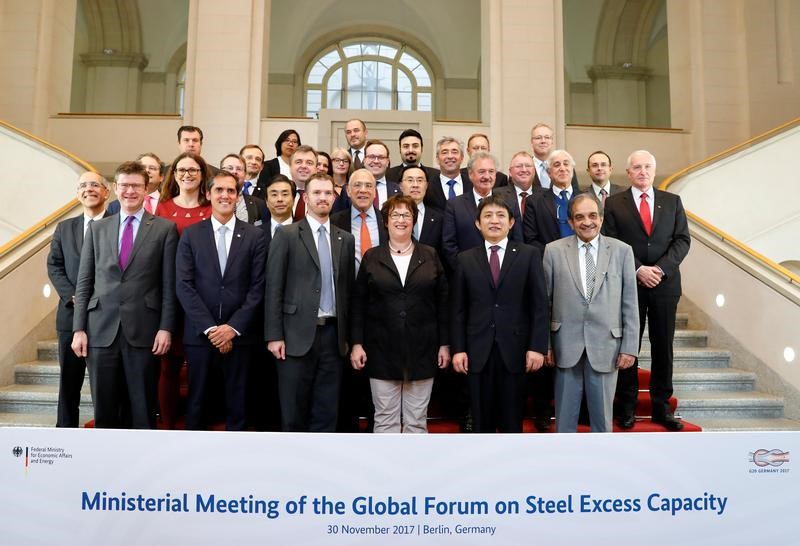By Thomas Escritt and Maytaal Angel
BERLIN/LONDON (Reuters) - China and the U.S. remained at odds on Thursday over how to combat excess capacity in the global steel sector, trading barbs at the conclusion of a ministerial level G20 industry summit in Berlin.
Representatives of G20 member states at the 'Global Forum on Steel Excess Capacity' said they had at least agreed on the need for dismantling market distorting subsidies, restructuring the sector, ensuring a level playing field and increasing transparency on capacity cuts.
But China and the U.S. remained far apart on many matters, with Beijing insisting it had done its bit to tackle the overcapacity problem while Washington said it would continue to protect its borders from what it sees as unfairly traded steel.
Assistant Chinese Commerce Minister Li Chenggang warned against a situation where his country makes painful efforts to cut capacity "while the rest of the world just watches".
China, which produces and consumes half the world's steel and, has cut some 100 million tonnes of legal capacity and another 120 million tonnes of illegal capacity since January 2016.
The U.S., the world's biggest steel importer, remains intent on pressuring China, both directly and through global forums such as the G20, to cut more capacity and avoid market-distorting subsidies.
Jamieson Greer, chief negotiator for the U.S., said the G20 forum had agreed "initial steps" but that far more needed to be done.
"Addressing excess capacity requires concrete policy steps (like) removing subsidies. State owned and private steelmakers need to be treated equally," he said.
"The forum hasn't made meaningful progress on the
root causes of steel excess capacity. The report doesn't have complete information on market distortions and doesn't have ways to get that data," he added.
U.S. President Donald Trump has repeatedly threatened to impose punitive tariffs on steel imports into the United Sates from China and beyond, even launching a 'section 232' investigation in April into whether steel imports pose a risk to national security.
Critics charge that using national security to erect steel tariffs could trigger a trade war with China, undermine the global rules-based trading system, hurt U.S. allies more than China and damage global growth prospects.
But Greer maintained the U.S. line on Thursday.
"This is forum in which we can talk about ways to move forward but action matters. We will take whatever lawful actions are available as needed," he said.
China has a target to cut 150 million tonnes of excess capacity by 2020.
Experts say a healthy steel industry requires at most 400 million tonnes of spare capacity above the 1.6 billion tonnes produced a year. They estimate there is currently some 730 million tonnes spare, about half of which is in China.
"Capacity reduction is a painful process, China has had to reallocate hundreds of thousands of workers. We call upon producers in the world to work together and take effective measures to reduce capacity," said Chenggang.
The global steel industry, worth about $900 billion (£666.69 billion) a year, is seen as a gauge of the world's economic health.
Direct steel imports from China into the United States have already fallen dramatically this year and last, but the U.S. maintains that its local steelmakers are indirectly hurt by unfairly traded Chinese steel which depresses global prices.

U.S. Commerce Secretary Wilbur Ross has until mid-January to conclude the section 232 probe into steel imports. Trump would then have 90 days to act and could invoke them without congressional approval.